NCERT Solutions for Class 7 English Unit 5 Rani Abbakka
| Table of contents |

|
| Let us do these activities before we read (Page 206) |

|
| Let us discuss (Page 213) |

|
| Let us think and reflect (Page 214) |

|
| Let us learn (Page 215) |

|
| Let us write (Page 221) |

|
Let us do these activities before we read (Page 206)
Q1: Solve the riddle given below and share your answer with your classmates and the teacher.
She was a queen who led the fight,
She fought for her country and her right.
With a shining sword in her hand,
Her son on her back in a cloth band
Remembered as a warrior grand,
She died defending her beloved Motherland.
Who is she?
Ans: The answer to the riddle is Rani Abbakka. She was a queen who fought bravely against the Portuguese to protect her country, Ullal. She is remembered as a great warrior who died defending her motherland.
Q2: Think of any other women warriors who made a significant contribution to India's struggle for Independence. Share your answers with your classmates and the teacher.
Ans: Other women warriors who contributed to India's struggle for Independence include Rani Lakshmibai of Jhansi, who fought against the British in 1857, and Captain Lakshmi Sahgal, who led the Rani of Jhansi Regiment in the Indian National Army.
Let us discuss (Page 213)
QI: Match the words in Column 1 with their meanings in Column 2. Share your answers with your classmates and the teacher.
Ans:
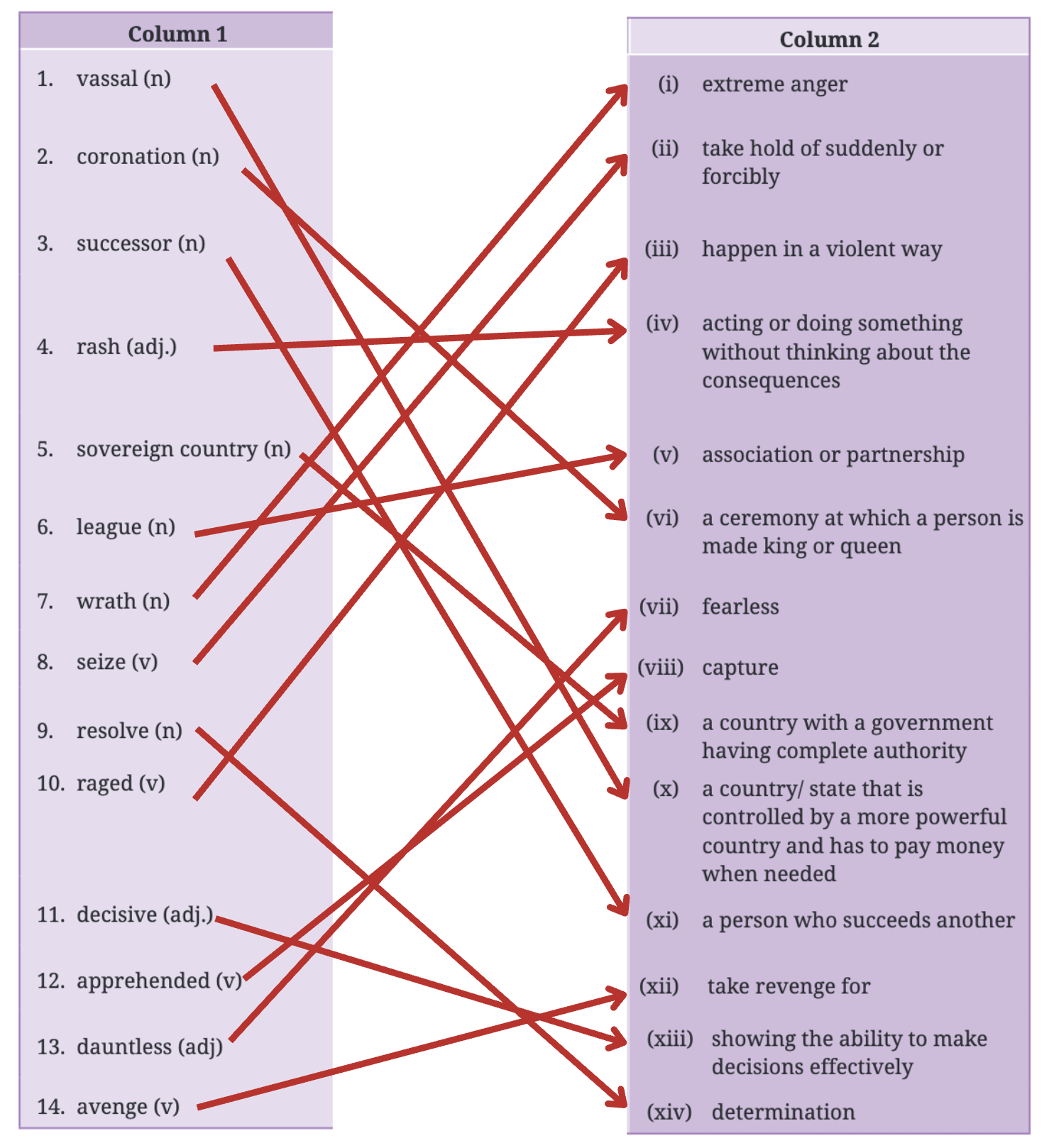
QII: Complete the table given below based on your understanding of the story. An example has been done for you. Share your answers with your classmates and the teacher.
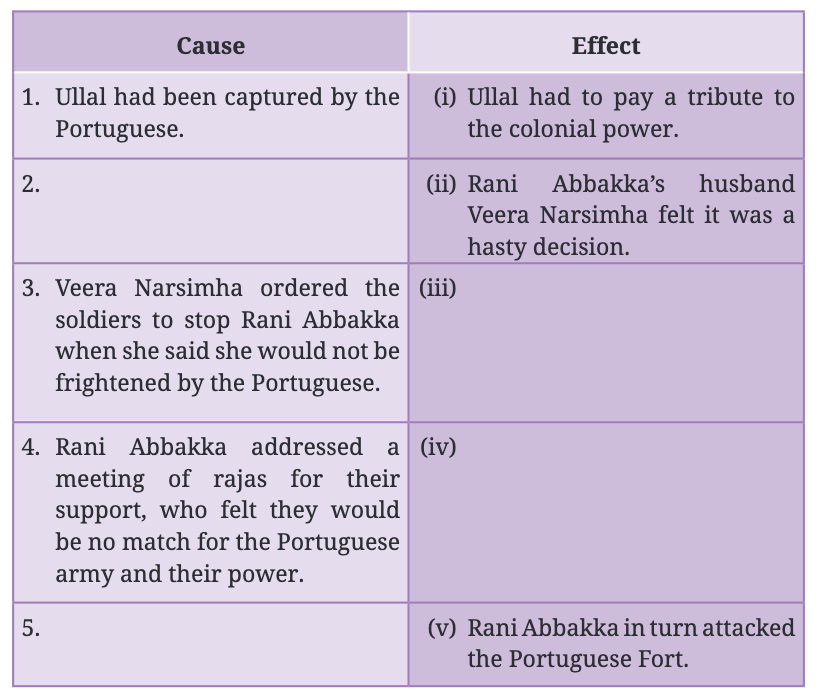
Ans:
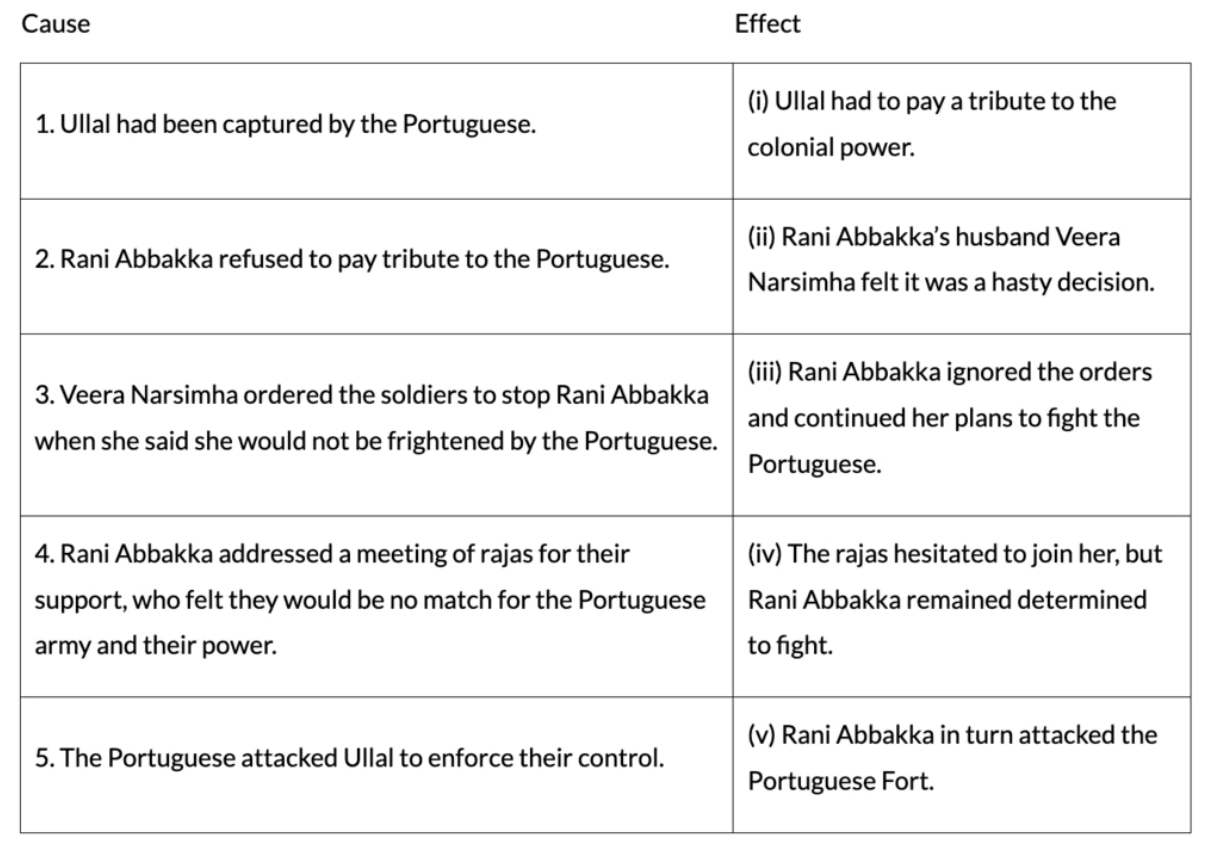
Let us think and reflect (Page 214)
QI: Read the extract given below and answer the questions that follow.
Portuguese envoy: Our Governor has sent me to remind you that the annual tribute from Ullal is long overdue and...
Rani Abbakka: We are a sovereign country. We don’t pay tribute to Portugal. And we don’t take orders from the Portuguese!
Portuguese envoy: Your Majesty, you will regret your stand.
Abbakka ordered merchant ships to be built and in alliance with the Zamorin of Kozhikode, she defied the Portuguese and established a hugely profitable trading relation with Arabia.
1. What does the word ‘tribute’ mean in this context?
Ans: In this context, ‘tribute’ means money or goods that Ullal had to pay to the Portuguese as a sign of being controlled by them.
2. Complete the sentence with a suitable reason. Rani Abbakka says, “We are a sovereign country” because
Ans: Rani Abbakka says, “We are a sovereign country” because Ullal is an independent nation with its own authority and does not accept Portuguese rule.
3. Identify whether the following statement is true or false. The Portuguese envoy threatened Rani Abbakka.
Ans: True. The Portuguese envoy threatened Rani Abbakka by saying, “Your Majesty, you will regret your stand.”
4. Choose a word given in brackets to replace the underlined word. “… she defied the Portuguese and established a hugely profitable trading relation with Arabia.” (defeated/disobeyed)
Ans: The word to replace ‘defied’ is ‘disobeyed’.
5. Choose the option that lists the qualities of Rani Abbakka, based on this extract.
(i) bold (ii) thoughtful (iii) capable (iv) generous (v) determined
A. (i), (ii), and (v)
B. (ii), (iii), and (iv)
C. (i), (iii), and (v)
D. (ii), (iv), and (v)
Ans: C. (i), (iii), and (v)
Rani Abbakka was bold in refusing the Portuguese, capable in building trade relations, and determined to defy foreign control.
QII: Answer the following questions.
1. Rani Abbakka spoke to her mother on her deathbed. How might these words have made her mother feel?
Ans: Rani Abbakka’s words to her mother, promising to protect Ullal and fight for its freedom, likely made her mother feel proud and reassured. Her mother would have felt confident that her daughter was strong and capable of leading Ullal.
2. What does the support of the people of Ullal and the soldiers for Rani Abbakka suggest about their mindset?
Ans: The support of the people and soldiers suggests they had a patriotic and brave mindset. They trusted Rwarning: This chunk ends abruptly and does not complete the sentence or provide further context for the remaining questions. Below, I will continue to provide answers for the remaining questions based on the provided document and ensure all questions related to "Rani Abbakka" are addressed, maintaining the requested format and simplicity.
3. How might the people of Ullal have felt when the mighty Portuguese were defeated?
Ans: The people of Ullal likely felt joyful, proud, and relieved when the Portuguese were defeated. Their victory would have boosted their confidence in Rani Abbakka’s leadership and their own strength as a community.
4. Why do you think Rani Abbakka’s victory against the Portuguese would have inspired other rulers to go against a foreign power?Ans: Rani Abbakka’s victory showed that a small kingdom like Ullal could defeat a powerful foreign force like the Portuguese. This would have inspired other rulers by proving that courage, strategy, and unity could overcome even strong enemies, encouraging them to resist foreign control.
Let us learn (Page 215)
QI: Study the following words from the text.
seize, sovereign, their, soldiers.
The spelling of the given words have ‘ei’ and ‘ie’ in them.
Spelling tip: ‘i’ before ‘e’ except after ‘c’.
For example: receive, deceive.
Now, fill in the blanks with ‘ie’ or ‘ei’ for the following words.
Ans:
c_ei_ling - ceiling
bel_ie_ve - believe
th_ie_f - thief
ach_ie_ve - achieve
perc_ei_ve - perceive
prot_ei_n - protein
soc_ie_ty - society
sh_ie_ld - shield
w_ei_ght - weight
fr_ie_nd - friend
QII: Study the highlighted word in the following sentence from the text.
…; and Bangadi too may have to face their wrath.
Was the initial letter ‘w’ pronounced? There are many words in the English language where certain letters are not pronounced but are spelt. They are called ‘silent letters’.
For example: campaign, knowledge, pneumonia, honour, calm. Now, find more words with silent letters.
Ans: The initial ‘w’ in ‘wrath’ is not pronounced; it is a silent letter. More words with silent letters include:
doubt (silent ‘b’)
wrist (silent ‘w’)
knight (silent ‘k’)
debt (silent ‘b’)
listen (silent ‘t’)
QIII: Read the following expressions from the text.
laughing stock, last laugh.
Use the dictionary page given below to find the meanings of the following. burst out laughing, don’t make me laugh, laugh until you cry, have a good laugh. Now, use these expressions in sentences of your own.
Ans:
burst out laughing: Suddenly start laughing.
Sentence: When Rani Abbakka tricked the Portuguese, her soldiers burst out laughing at their confusion.don’t make me laugh: Used to show something is impossible or ridiculous.
Sentence: The Portuguese thought they could scare Rani Abbakka—don’t make me laugh!laugh until you cry: Laugh so hard that tears come to your eyes.
Sentence: The people of Ullal laughed until they cried when they heard how Rani Abbakka outsmarted the enemy.have a good laugh: Find something amusing.
Sentence: After the victory, Rani Abbakka and her soldiers had a good laugh about the Portuguese’s failed attack.
QIV: Read the following dialogues from the text.
Rani Abbakka said, “I will make them pay for this.”
The merchants said to the Arabians, “Visit us again, brother.”
The given sentences are the direct words of the speaker; hence, they are in direct speech.
The reported forms or indirect forms of speech for the given sentences are:
Rani said that she would make them pay for that.
The merchants told the Arabian brothers to visit them again.
While reporting direct speech to indirect speech, we make certainmodifications related to time, place, and person.
- Time (Tense): Verbs are typically shifted back from a present tenseto a past form in reported speech to reflect the change in time.
- Place (Adverbs of Place): Words indicating place are adjusted to fitthe new context.
- Person: Pronouns and subjects are modified to align with theperspective of the reporter.
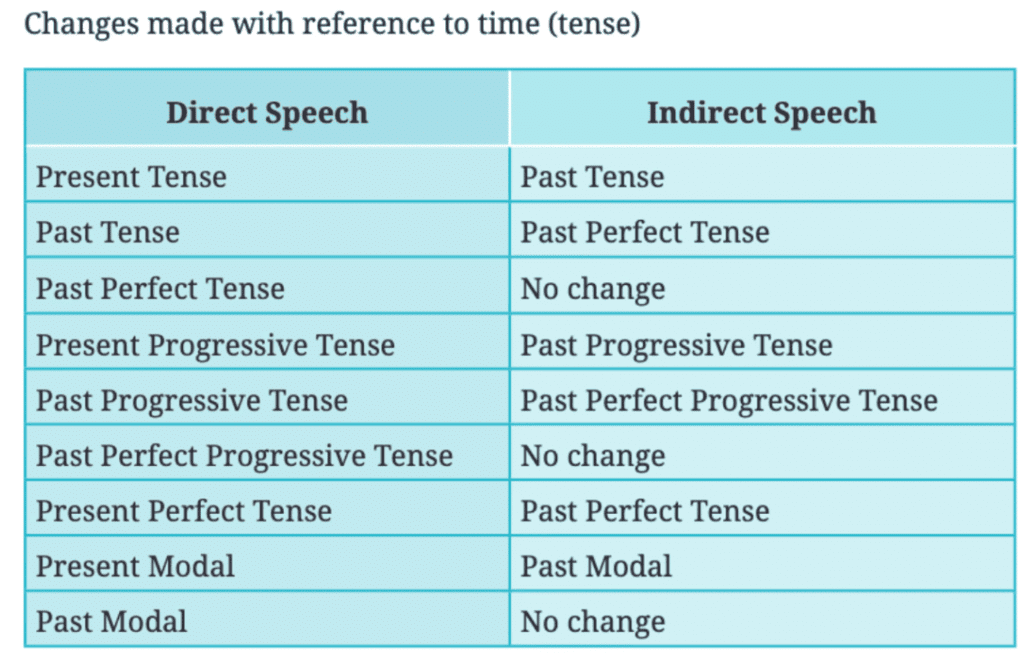
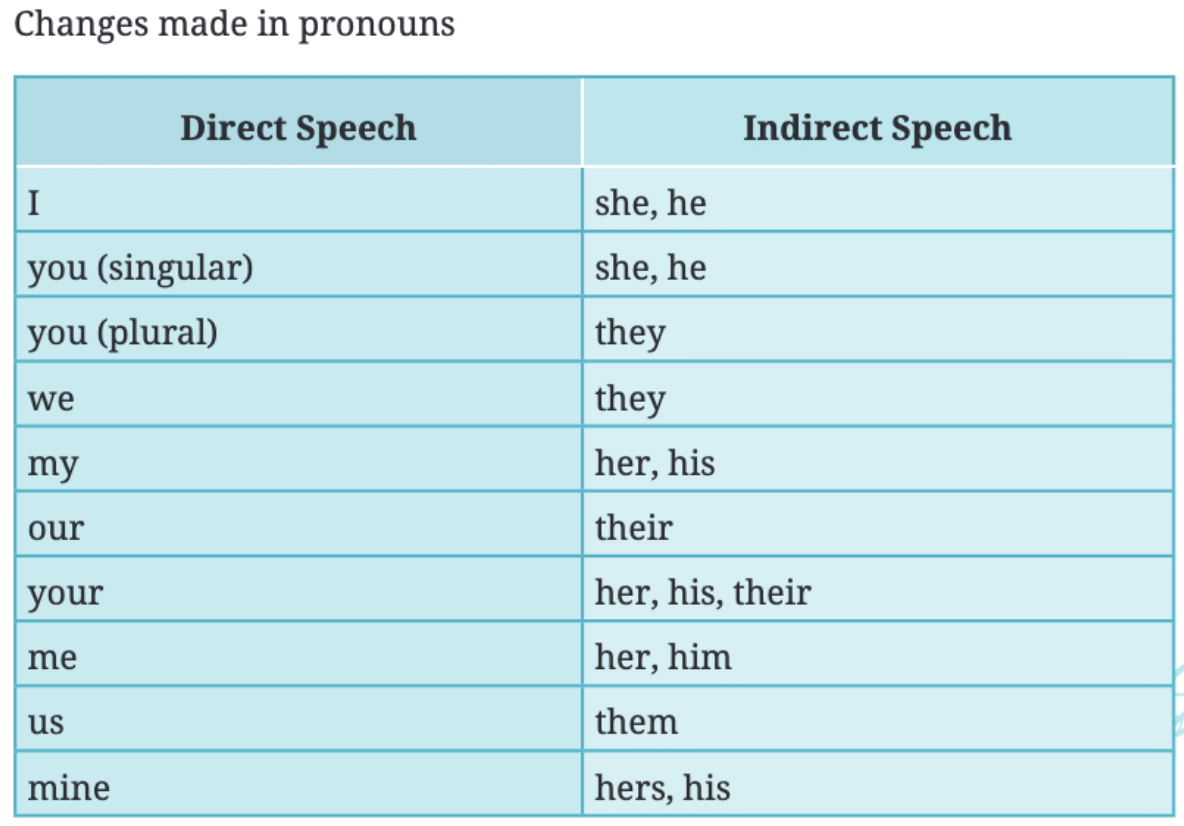
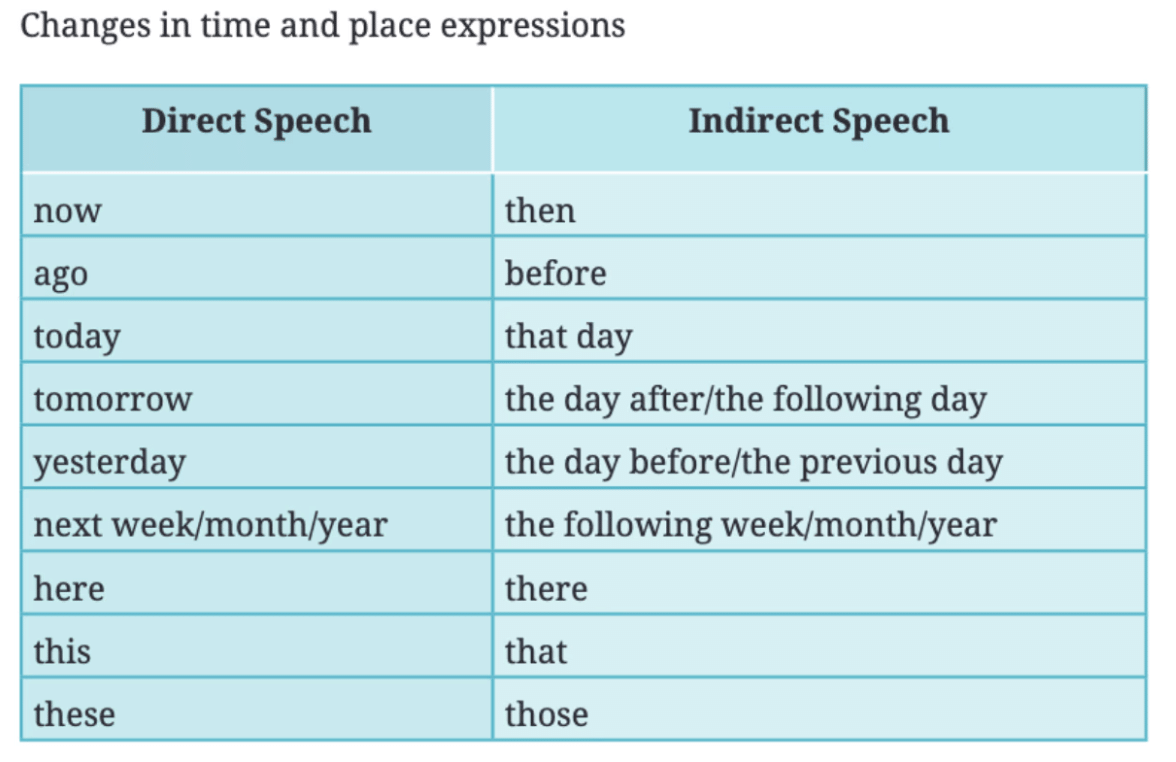
Rewrite the following sentences in direct speech to indirect speech. Remember to make the necessary changes.
Ans:
The teacher said, “Women of valour have made significant contributions throughout history.”
Ans: The teacher remarked that women of valour had made significant contributions throughout history.“I enjoy reading historical novels,” said Smitha.
Ans: Smitha shared that she enjoyed reading historical novels.The captain said to the coach, “Our team won the championship last year.”
Ans: The captain told the coach that their team had won the championship the previous year.The class teacher said, “Please turn off the lights when you leave.”
Ans: The class teacher requested that they turn off the lights when they left.“Finish the work before dinner,” said mother to Ravi.
Ans: Mother advised Ravi to finish the work before dinner.The vet said to the pet owner, “Take the dog for a walk.”
Ans: The vet instructed the pet owner to take the dog for a walk.
QV: Read the conversation between the Captain and the team.
Captain: We need to focus on our strategy for the final match.
Player: I have some ideas on how we can improve our strategy.
Captain: Make sure to share those ideas with the team during practice.
Complete the following paragraph by transforming the dialogue in the indirect form of speech.
Ans: The Captain remarked that they needed to focus on their strategy for the final match. To which one of the players replied that he had some ideas on how they could improve their strategy. The Captain advised the player to make sure to share those ideas with the team during practice.
Let us write (Page 221)
Q: India’s past was heroic, and at present, the pace of her development is inspiring. Women play a significant role in it. These women are around us, inspiring us all the time. With these thoughts, write a conversation between two students, Pratap and Tarana, discussing the role played by women in forming India’s identity as a strong nation.
Ans:
Pratap: Tarana, I have a lot of respect for women like Rani Abbakka, who fought bravely against the Portuguese to protect Ullal.
Tarana: I believe in the capabilities of women. Did you know Rani Lakshmibai led her army in the 1857 revolt against the British?
Pratap: Yes, their courage shaped India’s identity as a fearless nation. Women like Indira Gandhi also strengthened India as a global leader.
Tarana: Absolutely! Modern women like Kalpana Chawla, who became an astronaut, inspire us to aim high and contribute to India’s progress.
Pratap: I admire how women in the Armed Forces, like Captain Lakshmi Sahgal, fought for freedom and now serve the nation.
Tarana: And women like Kiran Bedi, who reformed policing, show how women lead with strength and vision.
Pratap: These women prove that India’s strength comes from their determination and leadership.
Tarana: I agree, Pratap. Their contributions make India a proud and powerful nation today.
|
55 videos|468 docs|76 tests
|
FAQs on NCERT Solutions for Class 7 English Unit 5 Rani Abbakka
| 1. Who was Rani Abbakka and what is her significance in Indian history? |  |
| 2. What were the major challenges faced by Rani Abbakka during her reign? |  |
| 3. How did Rani Abbakka demonstrate her leadership and military skills? |  |
| 4. What role did Rani Abbakka play in promoting women's empowerment in her time? |  |
| 5. Why is Rani Abbakka’s story important for contemporary society? |  |















